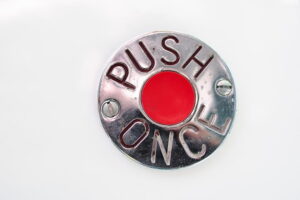As adults in our society today, why do so many of us carry regret?
We’ve done so many things we wish we hadn’t done.
We’ve had so many intentions we didn’t fulfill, promises we didn’t keep, goals we never reached.
Many of us are usually more disappointed in ourselves than we’ve ever been with anyone else—even those who may have wronged us.
But do any of us ever stop and actually think…
Why?
What I mean is…
What’s the point of holding onto feelings like these?
Do they serve a purpose? Do they somehow help us?
Instinctively, we know the answer is no.
Holding on to pain, anger, or resentment—whether it’s directed at other people or yourself—serves no purpose.
Not for your spouse, your children, your employees, your clients, your coworkers, or yourself.
Too often, though, we focus only on the internal cost associated with pain, anger, and resentment. It’s easy to see why. After all, we’re the ones in pain.
But in addition to the internal cost, there’s an external cost we largely overlook.
The External Cost of the Pain, Anger, and Resentment We Hold Inside
Just like dogs can sense fear in people, people sense bitterness in other people.
They don’t always know what they’re sensing, but I’ll tell you this:
- They don’t do business with it.
- They don’t stay married to it.
- They don’t invite it to dinner again.
People avoid those in whom they sense bitterness. So if you’re wondering why you can’t seem to get ahead at work, or why your partner is unhappy, or why you can’t attract more clients—or any type of opportunity—perhaps you should examine what you’re carrying around inside.
The 2 Options You Have for Dealing with Negative Emotions
There are two choices for dealing with the emotions that lead to bitterness and the external consequences we just discussed.
1. The Traditional Route: Anger Management
You’ve likely heard of anger management. The American justice system has made a fortune for someone by promoting the concept. Quite often, people are actually sentenced by our courts to attend an Anger Management course.
Effective? Not long term. Ridiculous? It depends upon what one wants.
If a person wants to “manage” their anger and learn how to keep rage and resentment bottled up inside them forever…anger management seems designed to do exactly that.
However, if your goal is to get rid of the anger all together, then there is an alternative…
2. The Solution That Actually Works
What if, instead of “learning to live with” negative emotions, we learned to let go of them altogether?
Forget Anger Management. You want Anger Resolution! Why manage it when you can get rid of it?
“How?” you ask.
It boils down to one word: forgiveness.
Forgiveness is THE RESET BUTTON for your mind and heart. And you can press it any time and as many times as you need. Know this: Forgiveness is a decision—not an emotion. Most of us have treated it like an emotion for most of our lives, which is why those FEELINGS seem to drag us around like a dog on a leash.
Remember Psychology 101? There we learned that emotions follow decisions. Yes, it may require us to make the decision again. We might have to make the decision six or seven times. Perhaps even seven time seventy times…but sooner rather than later, our emotions follow our decisions. That’s one more reason to make good ones!
It’s easy to understand how forgiveness can pay dividends in your personal life, but it’s a bit more difficult for most of us to grasp the value it holds in our professional lives. Allow me to explain it simply…
A lack of forgiveness is costing you money. It’s costing you opportunities. It is preventing sales. A lack of forgiveness makes it easy to pass you over for a promotion.
A lack of forgiveness cripples your ability to roll with the punches and keep moving forward toward the best possible result. Instead of freeing you to build the future of your choosing, a lack of forgiveness traps you in the past.
As The Designated Noticer for major corporations, I have seen a lack of forgiveness poison entire companies. I have seen it chain corporations to destructive cultures and horrendous workplace environments. All without anyone ever realizing that a lack of forgiveness was the root of most of their problems.
And the worst part, of course, was that even if they had identified the issue, they probably wouldn’t have realized how simple this one is to fix. But then, most people don’t…
See, for a long time I thought forgiveness was like a knighthood. It was something I would bestow upon some lucky person who begged me for it. Preferably on their knees. Tears would have been considered a plus.
Curiously, however, after researching the topic for almost thirty years, I still cannot find a single expert or book (including the Bible) to tell me that for one person to forgive another person, the person being forgiven has to ask for it, deserve it, or even be aware that they are being forgiven!
The 3 Things You Need to Remember About Forgiveness
- Forgiveness is about you. Trust is about them.
- Forgiveness is about the past. Trust is about the future. Do we forgive somebody who steals from us? Yes. Do we continue to do business with him? No.
- Forgiveness, as I stated earlier, is a decision, not an emotion. You can decide to forgive someone while still feeling angry or hurt by their actions. The decision leads the emotions—not the other way around. To paraphrase the psychologist William James, you will not sing because you are happy; you will become happy because you decided to start singing and kept singing even though, for a time, you did not feel like it.
While you may already be formulating a mile-long list of people you wish to forgive (whether or not they have asked for forgiveness, deserve it, or are even aware of it), the most important person you need to forgive first is yourself.
If you don’t, your effectiveness as a spouse, parent, friend, or leader will suffer. The key to moving toward your desired future is forgiveness. Specifically, this forgiveness of yourself.
Let me show you how.
Below is an excerpt from my book The Seven Decisions:
We now have the opportunity to begin anew, to drop the heavy weight of guilt resting upon our shoulders. Month after month, year after year, we’ve added to the load, and it’s about to crush us. All the things we said we were going to do but didn’t, the promises we made and didn’t keep, the things we shouldn’t have done but did anyway have piled up, and it’s just too much for one person to bear. The guilt has turned into resentment, the resentment has turned into anger, and the anger, in its various forms, is taking over our lives.
For many of us, our greatest enemies have been ourselves. Every mistake, every miscalculation, every stumble we make is replayed in our minds. Every broken promise, every day wasted, every goal not reached has energized the disgust we feel about our predicament. This dismay develops into a paralyzing grip. When we disappoint ourselves, it sets in motion a continual cycle of disappointment. It’s true. It is impossible to fight an enemy living in our heads.
Forgive yourself. Begin anew. The simple act of forgiving yourself will change your life! You will be positioned to become the person you want to be when you finally ditch the weight of guilt and shame you’ve been piling on for years. Forgive yourself. Your family’s not mad at you. Your friends aren’t mad at you. I’m not mad at you. God’s not mad at you. You don’t need to be mad at you either. Let it go. Forgive yourself and begin again.
From this day forward, your history needs to stop controlling your destiny. Your life has just begun! Your forgiveness is valuable only when you give it away. By the simple act of forgiveness, you can release the demons of your past and create a new beginning for yourself.
Forgive the people who don’t ask for it. Forgive yourself. From now on, your act of forgiveness will free you from unproductive thoughts. Your bitterness, resentment, and anger will be gone. It’s time to begin again.
“I will greet each day with a forgiving spirit.”
If you want to take this a step further, I invite you to write yourself a letter of forgiveness and appreciation. The purpose of this letter is to free yourself from whatever you’ve been harboring inside. Commit to releasing something that you don’t need to hold on to any longer.
Here is an example from The Seven Decisions to guide you:
Dear [your name],
I’ve missed you. It has been too long since I’ve seen the fun, happy person I know you to be. So now I want to ask for your forgiveness about something.
You will remember, it was five years ago . . . [describe the event].
In closing, I want to acknowledge that you are one of the most special people in the world. These are the things that I appreciate about you . . . [list them].
Thank you for magical moments that you create for so many. The ripples that you create by the way you live reach many more than you could ever know . . . [list them].
Love, [your name]
If you are in a leadership position and find this exercise beneficial, I encourage you to share it with your team. Let them experience the power of forgiveness and watch how it will dramatically improve your work environment, morale, and success.





